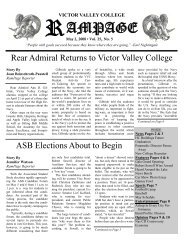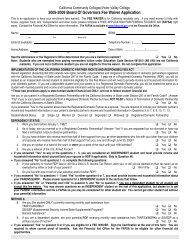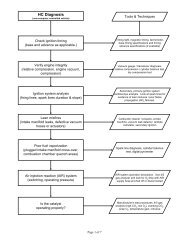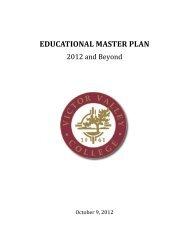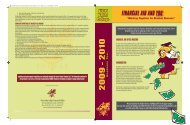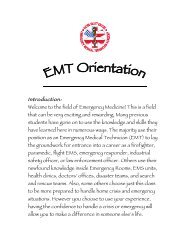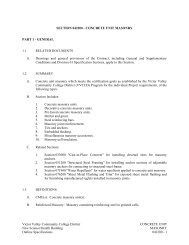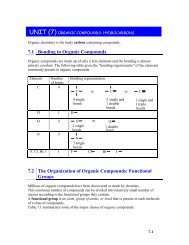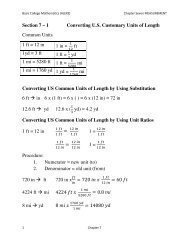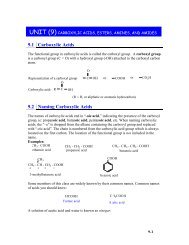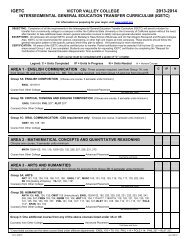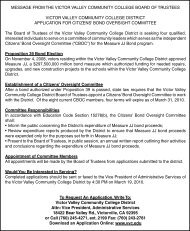Download - Victor Valley College
Download - Victor Valley College
Download - Victor Valley College
You also want an ePaper? Increase the reach of your titles
YUMPU automatically turns print PDFs into web optimized ePapers that Google loves.
PROGRAMS / COURSE DESCRIPTION<br />
FIRE 54 FIRE COMMAND 2E<br />
Units: 2.0 - 32-36 hours lecture. (No prerequisite.<br />
Pass/No Pass)<br />
This course prepares the fire fighter student to manage<br />
the large wildland fire incident. Topics of discussion<br />
include: California’s wildland fire problem, fire safety,<br />
weather effects, wildland fuel behavior, attack methods,<br />
using support equipment, strategy and tactics, air attack<br />
operations, and using maps. Simulation is featured.<br />
Chief Officer certified.<br />
FIRE 55 FIRE INSTRUCTOR 2A<br />
Units: 2.5 - 40-45 hours lecture. (Prerequisite: FIRE 70<br />
and FIRE 71. State mandated. Grade Option)<br />
This course is designed to provide the fire technology<br />
student the skills to evaluate students. Topics include:<br />
construction of written (technical knowledge) and<br />
performance (manipulative skills) tests, as well as test<br />
planning, test analysis, test security, and evaluation of<br />
test results to determine instructor and student<br />
effectiveness. Essential course for writing valid,<br />
objective tests.<br />
FIRE 56 FIRE INSTRUCTOR 2B<br />
Units: 2.5 - 40-45 hours lecture. (No prerequisite.<br />
Grade Option)<br />
This course is designed for the fire technology student<br />
who require skills leading groups of people in staff<br />
meetings, group discussions, and training sessions to<br />
solve problems, determine objectives, generate new<br />
ideas and provide instruction to subordinates.<br />
FIRE 58 INTRODUCTION TO EMERGENCY<br />
MANAGEMENT<br />
Units: 4.0 - 64-72 hours lecture. (No Prerequisite.<br />
Grade Option)<br />
This course provides the history, terminology, goals and<br />
mission of the Emergency Management occupation and<br />
profession. The roles, responsibilities, lines of authority<br />
and characteristics of effective program managers are<br />
presented. Professional associations, federal support<br />
programs, model state practices and functional activities<br />
are also discussed.<br />
FIRE 58A COMMUNITY DISASTER PLANNING<br />
Units: 4.0 - 64-72 hours lecture. (No Prerequisite.<br />
Grade Option)<br />
This course provides the student with the information<br />
and details to develop a community or company disaster<br />
plan. Topics of discussion include: developing a disaster<br />
plan for a company or community, developing a hazard<br />
analysis and capability assessment, building consensus,<br />
leveraging political assets to insure community<br />
readiness, and the process of adoption and revision.<br />
Students also will receive certificates from the Federal<br />
Emergency Management Agency (FEMA): IS-15,<br />
Special Event Contingency Planning; IS-3, Radiological<br />
Emergency Preparedness; IS-324, Community<br />
Hurricane Planning; IS-11, Animals in Disasters,<br />
Community Planning.<br />
FIRE 58B EMERGENCY MANAGEMENT RESPONSE<br />
Units: 4.0 - 64-72 hours lecture. (No Prerequisite.<br />
Grade Option)<br />
This course provides the student with the information<br />
and details of coordinating and operating a community<br />
emergency operations center (EOC). How to coordinate<br />
the resources of a community or company, identify<br />
specific threats, and the operational requirements of an<br />
EOC are presented. Students will also receive certificate<br />
of completion from the Federal Emergency<br />
Management Agency (FEMA): IS-275, The Role of the<br />
EOC in Community Preparedness, Response and<br />
Recovery; IS-271, Anticipation of Weather and<br />
Community Risk; IS-301, Radiological Emergency<br />
Response; Q-534, Emergency Response to Terrorism;<br />
IS-288, Managing Volunteer Resources.<br />
FIRE 58C EMERGENCY MANAGEMENT RECOVERY<br />
Units: 4.0 - 64-72 hours lecture. (No Prerequisite.<br />
Grade Option)<br />
This course provides the student with the information<br />
and details of making the transition from response to<br />
recovery to a company disaster. Case studies examine<br />
mass fatality management, earthquakes, flooding and<br />
terrorism incidents. Students receive certificates of<br />
completion from the Federal Emergency Management<br />
Agency (FEMA): IS-7, Citizens Guide to Disaster<br />
Assistance; IS-208, State Disaster Management; IS-<br />
600, Special Considerations for FEMA Public<br />
Assistance Projects; IS-630, Introduction to the Public<br />
Awareness Process.<br />
FIRE 58D INTRODUCTION TO MITIGATION FOR<br />
DISASTERS<br />
Units: 4.0 - 64-72 hours lecture. (No Prerequisite.<br />
Grade Option)<br />
This course provides the student with the information<br />
and details to plan and implement mitigation strategies<br />
for a community or business. Mitigation includes all<br />
activities that improve a community or business’s<br />
survivability from an identified threat. Identifying needs,<br />
obtaining funding and executing mitigation programs are<br />
the objectives of this course. Students also will receive<br />
certificates of completion from the Federal Emergency<br />
Management Agency (FEMA): IS-393, Introduction to<br />
Mitigation; IS-394, Mitigation for the Homeowner; IS-8,<br />
Building for the Earthquake of Tomorrow; IS-9,<br />
Managing Floodplain Development.<br />
FIRE TECHNOLOGY<br />
2012-2013 <strong>Victor</strong> <strong>Valley</strong> <strong>College</strong> Catalog 229



